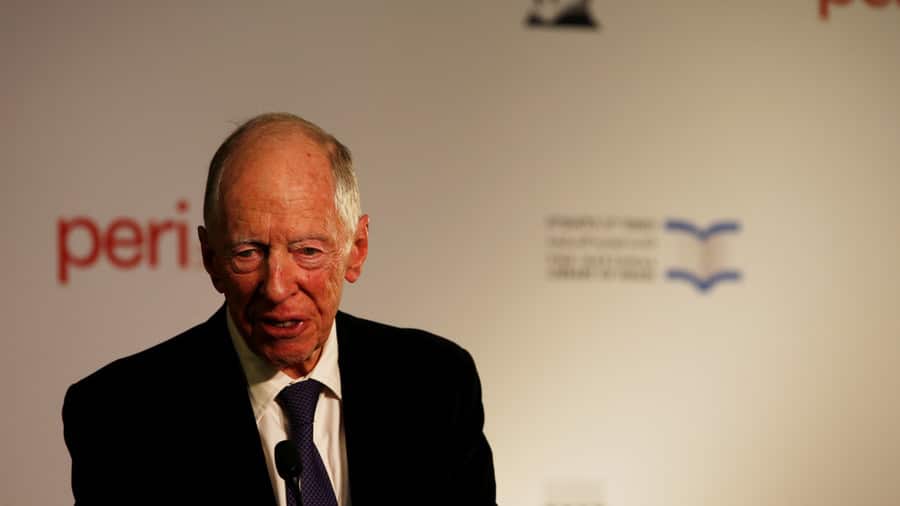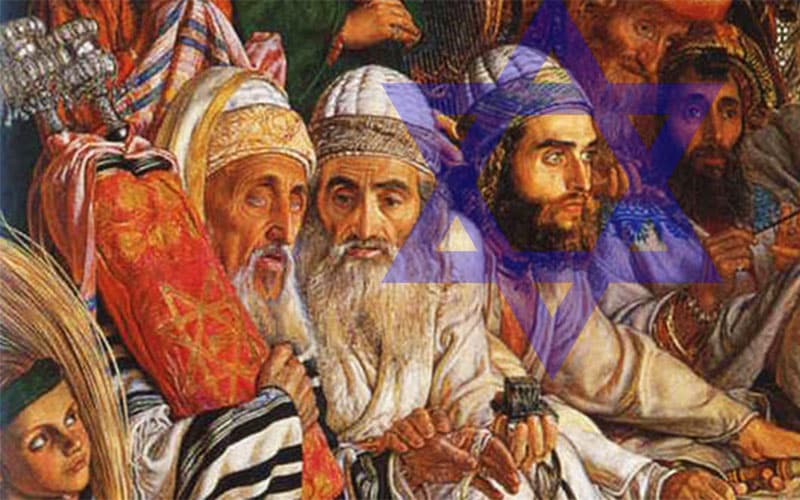
South Africans: Rothschilds Sucking Country’s Economy Dry
“No one does more to further the revolution than the Rothschilds themselves…”
…by Jonas E. Alexis, VT Editor
From Russia Today: South African unions accused the Rothschilds of capturing “the country’s State Owned Enterprises” (SOEs) and “interfering” in “SOEs for ‘selfish and greedy purposes.’”
“The statement alleged that the wealthy family intended to collapse South African Airways (SAA) so it could be privatized… The South African unions said that the Rothschilds were using an alleged link to SAA board member Mark Kingston, who is also the executive chair of Rothschild & Co. in South Africa and was previously its CEO.
“The unions want the removal of various SAA board members, including Kingston, as well as another board member who actually carries the Rothschild name – former Johannesburg Stock Exchange chairperson Geoff Rothschild.”[1]
Is that a surprise? Not really. Just open an unbiased and scholarly history book and you will find the crimes and wicked behavior of the Rothschild family.

The Rothschild’s dominance and power through covert means was even admitted by historian Gustavus Myers, who wrote in The History of the Great American Fortunes that “under the surface, the Rothschilds had a powerful influence in dictating American financial laws. The law records show that they were the power in the old Bank of the United States.”[2]
S.C. Mooney writes that “the Rothschild family stands out in history as the prime example of manipulating the power of international banking… By means of usury on an international scale, they were able to consolidate great wealth and power to turn world affairs according to their own fancy.”[3] The Rothschilds financed wars in England and America, collecting huge interest rates and making a massive profit.
By the middle of the nineteenth century, the Bank of England was dominantly controlled by the Rothschild family. As Jewish Austrian writer Frederic Morton wrote, by the middle of the nineteenth century, “Rothschild was now banker to empires and continents—to all the principal European countries, to Eurasian Russia, to the Americas, to the Indies…In Paris, in Vienna, in Frankfurt and Naples, the titanic brother branches were just as busy.”[4]
Jewish historian Esther Benbassa has similar views.[5] She states that “the Rothschilds were Scottish Rite Masons,”[6] but Benbassa saw Freemasonry as a noble and tolerant religious organization that had welcomed Jews.[7]
Philo-Semitic historian Niall Ferguson declared that Nathan Rothschild “was able to become the principal conduit of money from the British government to the continental battlefields on which the fate of Europe was decided in 1814 and 1815.”[8] Nathan, according to Ferguson, “became the master of the bond market” and “the master of European politics” during the Napoleonic war.[9]

By the nineteenth century, Nathan established “the biggest bank in the world.”[10] An American magazine complained in the 1830s that “not a cabinet moves without [the Rothschilds’] advice. They stretch their hand, with equal ease, from Petersburg to Vienna, from Vienna to Paris, from Paris to London, from London to Washington.”[11]
The Rothschilds, in relation to the Rockefeller Foundation, were behind the “fiat money and inflationist policy of the early New Deal.”[12] (In 2012, the Rothschilds again attempted to merge British and French banking operations in order to gain more control. David de Rothschild declared that the new system would “better meet the requirements of globalization in general and in our competitive environment in particular while ensuring my family’s control over the long term.”[13])
Ferguson, of course, does not attribute the Rothchild’s economic power to usury or economic manipulation or even theft but to “sheer good luck,”[14] something that is hardly rational.
There were other voices, however, who thought the Rothschilds were up to something. In 1828, Thomas Dunscombe declared:
“Master of unbounded wealth, [Nathan] boasts that he is the arbiter of peace and war, and that the credit of nations depends upon his nod; his correspondence are innumerable; his couriers outrun those of sovereign princes, and…ministers of state are in his pay.”[15]
Henry Clews, the American financier who wrote Twenty-Eight Years in Wall Street in 1888, declared that the Rothschilds were making a fortune in America through German banker August Schonberg, who changed his name to Belmont when he came to the United States.[16]

Clews states that through his “avariciousness” and “penuriousness,” Nathan Rothschild in particular would “manipulate the market.”[17]
Carroll Quigley claimed that the Rothschilds, among other bankers, were secretly misleading governments and people; he says that Mirabaud and the Rothschilds became the dominant financial system between 1871 and 1900. British economist J. A. Hobson declared in 1902 that nothing could be pursued “by any European state…if the house of Rothschild…set their face against it.”[18]
The Rothschilds ended up making a fortune during the Napoleonic Wars.[19] Austrian-born Jewish writer Frederic Morton (born Fritz Mandelbaum) declared that the Rothschilds “conquered the world more thoroughly, more cunningly, and much more lastingly than all the Caesars before or all the Hitlers after them.”[20]
Morton’s assertion is corroborated by biographer Derek Wilson, who declared that the Rothschilds were so financially and politically powerful that even royal governments and political leaders were afraid of them.[21] Their influence was so covert that Wilson moves on to say that
“clandestinity was and remained a feature of Rothschild political activity…Yet all the while they were helping to shape the major events of the day: by granting or withholding funds; by providing statesmen with an unofficial diplomatic service; by influencing appointments to high office; and by almost daily intercourse with the great decision makers.”[22]

Ferguson himself declared:
“No one does more to further the revolution than the Rothschilds themselves…and, though it may sound even more strange, these Rothschilds, the bankers of kings, these princely pursestring-holders, whose existence might be placed in the gravest danger by a collapse of the European state system, nevertheless carry in their minds a consciousness of their revolutionary mission. I see in Rothschild one of the greatest revolutionaries who have founded modern democracy.”[23]
In many ways, they founded “modern democracy” by destroying the old system and replacing it with Jewish mammon. “Rothschild…destroyed the predominance of land, by raising the system of state bonds to supreme power, thereby mobilizing property and some income and at the same time endowing money with the previous privileges of the land. He thereby created a new aristocracy, it is true, but this, resting as it does on the most unreliable of elements, on money, can never play as endurably regressive a role as the former aristocracy, which was rooted in the land, in the earth itself.”[24]
Ferguson even admitted that the Rothschilds represented “a new materialist religion,” which is none other than money. Heinrich Heine saw the same thing: “‘Money is the god of our time,’ declared Heine in March 1841, ‘and Rothschild is his prophet.’”[25]
Heine saw this as dangerous to the Jews. Marx saw it too.
First published in June 2019.
Citations
- [1] “Rothschilds accused of preying on South Africa’s state-owned enterprises,” Russia Today, June 20, 2019.
- [2] Gustavus Myers, The History of the Great American Fortunes, Vol. III (Chicago: Charles H. Kerr & Co., 1910), 183-184.
- [3] S. C. Mooney, Usury: Destroyer of Nations (Warsaw, OH: Theopolis, 1988), 90.
- [4] Frederic Morton, The Rothschilds (New York: Scribners, 1988), 101.
- [5] Esther Benbassa, The Jews of France: A History from Antiquity to the Present (Princeton: Princeton University Press, 1999), 104.
- [6] Ibid.
- [7] Ibid., 122.
- [8] Niall Ferguson, The House of Rothschild, 19.
- [9] Niall Ferguson, The Ascent of Money: A Financial History of the World (New York: Penguin, 2008), 78.
- [10] Ibid.
- [11] Ferguson, The House of Rothschilds, 19.
- [12] Murray N. Rothbard, A History of Money and Banking in the United States (Auburn, AL: Ludwig von Mises, 2002), 307.
- [13] Harry Wilson, “Rothschids to Merge British and French Banking Operations to Secure Control,” Telegraph, April 5, 2012.
- [14] Ferguson, House of Rothschilds, vol. I, 85.
- [15] Ferguson, Ascent of Money, 78.
- [16] See Henry Clews, Twenty-Eight Years in Wall Street (New York: Vintage Boosk, 2005), chapter 28.
- [17] Ibid.
- [18] Liaquat Ahamed, Lords of Finance: The Bankers Who Broke the World (New York: Penguin, 2009), 210.
- [19] Ibid., 210; see also Egon Caesar Corti, The Rise of the House of Rothschild (New York: Cosmopolitan Book Corp., 1928).
- [20] Morton, The Rothschilds, 14.
- [21] Derek Wilson, Rothschild: The Wealth and Power of a Dynasty (New York: Scribner’s, 1980), 98-99.
- [22] Ibid., 99.
- [23] Ferguson, The House of Rothchild, Vol. I, 16.
- [24] Ibid., 16-17.
- [25] Ibid., 17.


